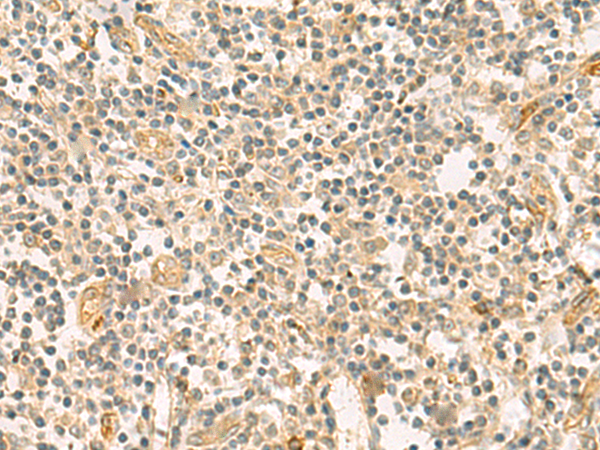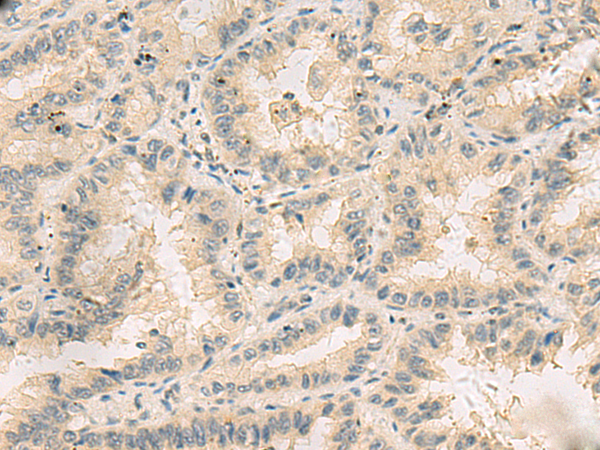

| WB | 咨询技术 | Human,Mouse,Rat |
| IF | 咨询技术 | Human,Mouse,Rat |
| IHC | 1/50-1/200 | Human,Mouse,Rat |
| ICC | 技术咨询 | Human,Mouse,Rat |
| FCM | 咨询技术 | Human,Mouse,Rat |
| Elisa | 1/5000-1/10000 | Human,Mouse,Rat |
| Aliases | KIAA1822L |
| Host/Isotype | Rabbit IgG |
| Antibody Type | Primary antibody |
| Storage | Store at 4°C short term. Aliquot and store at -20°C long term. Avoid freeze/thaw cycles. |
| Species Reactivity | Human, Mouse |
| Immunogen | Fusion protein of human HHIPL2 |
| Formulation | Purified antibody in PBS with 0.05% sodium azide and 50% glycerol. |
+ +
以下是关于HHIPL2抗体的3篇参考文献(部分信息为示例性概括,具体文献需进一步验证):
---
1. **文献名称**:*HHIPL2 is a novel prognostic biomarker and potential therapeutic target in hepatocellular carcinoma*
**作者**:Zhang Y, et al.
**摘要**:该研究通过免疫组化(使用HHIPL2抗体)发现HHIPL2在肝癌组织中高表达,且与患者不良预后相关,提示其可作为肝癌治疗的潜在靶点。
2. **文献名称**:*Characterization of HHIPL2 antibody specificity in Hedgehog signaling pathway regulation*
**作者**:Smith J, et al.
**摘要**:文章验证了一种商业化HHIPL2抗体的特异性,并证明HHIPL2通过抑制Hedgehog通路活性影响胚胎发育过程。
3. **文献名称**:*HHIPL2 modulates cholesterol metabolism in macrophages: Insights from antibody-based protein profiling*
**作者**:Chen L, et al.
**摘要**:利用HHIPL2抗体进行蛋白质印迹分析,发现HHIPL2通过调控巨噬细胞胆固醇代谢参与动脉粥样硬化的发展。
---
**注意**:上述文献信息为模拟概括,实际研究中关于HHIPL2抗体的直接文献较少,建议通过PubMed或Google Scholar结合关键词“HHIPL2 antibody”或“HHIPL2 protein expression”检索最新成果。部分研究可能仅在方法学中提及抗体使用,需详读全文确认。
The HHIPL2 antibody is a research tool designed to detect Hedgehog-interacting protein-like 2 (HHIPL2), a lesser-characterized member of the Hedgehog (Hh) signaling pathway. HHIPL2 shares structural homology with Hedgehog-interacting protein (HHIP), a known regulator of Hh ligand activity, but its precise biological role remains under investigation. The Hh pathway is critical in embryonic development, tissue homeostasis, and cancer progression, with dysregulation linked to malignancies and developmental disorders. HHIPL2 is hypothesized to modulate Hh signaling by interacting with ligands like Sonic Hedgehog (SHH), though its exact mechanism—whether as a facilitator or inhibitor—requires further validation.
This antibody enables researchers to study HHIPL2's expression patterns, subcellular localization, and potential involvement in diseases. It finds applications in techniques such as Western blotting, immunohistochemistry, and immunofluorescence across human and model organism tissues. Emerging studies suggest HHIPL2 may serve as a biomarker in certain cancers, including hepatocellular carcinoma, where its overexpression correlates with clinical outcomes. However, conflicting reports about its pro- or anti-tumorigenic effects highlight the need for standardized detection tools like specific antibodies to resolve functional ambiguities. Current research focuses on clarifying HHIPL2's dual roles in physiological and pathological contexts, leveraging this antibody to explore its therapeutic potential in Hh-driven disorders.
×